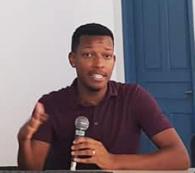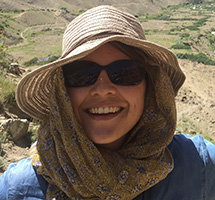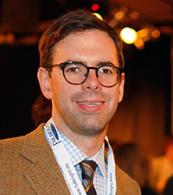Poe and Freeze found great value in the extended community of scholars they connected with, while Poe and Wildanger both benefited from giving presentations on their research. A highlight of Wildanger’s year was meeting Angela Merkel, a fellow Fulbrighter, in Berlin. Their advice for those applying includes starting early, sharing your research succinctly and without jargon, and asking others to review the application, specifically the Writing Center at Brown.
Sub Navigation
Q & A with the 2018-2019 Fulbrighters
Graduate students Watufani Poe, Katherine Freeze and Geoffrey Wildanger have recently completed their Fulbright year with research in Brazil, Tajikistan and Germany respectively. They share highlights of their research and study, key moments from the year and advice for future Fulbright applicants.
Watufani Poe, Africana Studies
 Poe is a doctoral candidate in Africana Studies and also a master’s student in History through the Open Graduate Education Program. His Fulbright research was focused in Brazil studying Black LGBTQ activism throughout the country, looking how Black LGBTQ activists define freedom for themselves and their communities in the face of oppressive violence.
Poe is a doctoral candidate in Africana Studies and also a master’s student in History through the Open Graduate Education Program. His Fulbright research was focused in Brazil studying Black LGBTQ activism throughout the country, looking how Black LGBTQ activists define freedom for themselves and their communities in the face of oppressive violence.
On how his participation has enhanced his scholarship
The Fulbright program has not only allowed me to conduct numerous in-depth ethnographic interviews and robust archival research, but it also has allowed me to connect with various scholars also working on their own research topics here in Brazil, giving me a community of scholars to rely on and process my ideas with.
A Highlight of the research year
The highlight of my year was being able to present my research at the Federal University of the Recôncavo of Bahia (UFRB) on Black queer and trans activism to a room full of mostly Black queer and trans students and scholars from the university. The conversations that sparked during the question and answer session of the talk were incredibly insightful for the path of my research and it was a beautiful moment of the kind of Black queer diasporic encounters I am documenting in my work.
Advice for those who want to apply
Get started on your application early (for instance in the summer), and send your application to various people to read and give feedback to better your materials.
Katie Freeze, Ethnomusicology
 Freeze is conducting dissertation fieldwork on the contemporary music practices of Ismaili Muslims living in Badakhshan, a remote territory of the Pamir Mountains of eastern Tajikistan bordering China, Afghanistan and Kyrgyzstan.
Freeze is conducting dissertation fieldwork on the contemporary music practices of Ismaili Muslims living in Badakhshan, a remote territory of the Pamir Mountains of eastern Tajikistan bordering China, Afghanistan and Kyrgyzstan.
On how her participation has enhanced his scholarship
With the support of Fulbright I have been able to broaden and deepen my ethnographic and textual investigation. My affiliation with Fulbright has helped me to access key archival materials and to cultivate a wide network of colleagues who share similar research interests.
A Highlight of the research year
One of the most significant aspects of my Fulbright research experience has been friendly and mutually beneficial exchanges with local scholars. I look forward to future collaborations with them.
Advice for those who want to apply
Convey the terms of your research project succinctly and with as much concrete detail as space permits, showing that you are prepared to undertake the task. If possible, show that you already have an institutional, social and/or professional framework established in the host country which can provide at least an initial context for your research activities. Show that this project matters both to you and to your academic field.
Geoffrey Wildanger, Comparative Literature
 Wildanger spent his year at Leipzig University based in the German Studies department collaborating with the African Studies and Philosophy departments, the Simon Dubnow Institute for Jewish Studies, as well as with the Deutsche Bücherei Library. His research focuses on German, French, and English literature, including multilingual survivors of the Shoah, colonialism, and writers involved with the U.S. Civil Rights Movement.
Wildanger spent his year at Leipzig University based in the German Studies department collaborating with the African Studies and Philosophy departments, the Simon Dubnow Institute for Jewish Studies, as well as with the Deutsche Bücherei Library. His research focuses on German, French, and English literature, including multilingual survivors of the Shoah, colonialism, and writers involved with the U.S. Civil Rights Movement.
On how his participation has enhanced his scholarship
The Fulbright program has provided me with unparalleled opportunities to enhance my work in manifold ways. First, I was able to access archives in Germany and spend a great deal of time with the material. Second, being embedded in a German university and department allowed me better insight into the various modes of pedagogy and mentoring as they are practiced internationally. Finally, spending time with Germans outside of the university, meeting my neighbors and such, helped me understand the heterogeneity and diversity of contemporary German society.
Highlights of the research year
My highlight was meeting Angela Merkel. She won the Fulbright Award and so the ceremony was held in Berlin, rather than DC, to accommodate her schedule. Some of us Fulbrighters were able to attend, despite the space limiting the audience to around 150 people. After a short acceptance speech on the importance of diplomacy and international understanding, she announced that she would stay for the reception, on the condition that no one requested a selfie! It was quite impressive to see a leader of her stature in person. My second highlight was presenting my research to the University of Leipzig community. My dissertation is quite long and being written in English, and it was a productive challenge to summarize as much of it as possible into a half-hour lecture in German. Compression is never easy, and it is only harder when it also involves switching languages!
Advice for those who want to apply
The most important thing is to make an appointment at the Writing Center. Many graduate students do not make use of this resource — to their peril. Fulbright applications must speak to a broad audience, one that includes academics and non-academics. The criteria are neither purely academic nor subject specific, although the rigor of one’s research must be unimpeachable. Rather than packing your application with jargon, you should stress the consequential nature of your research, its consequences on global citizenship as well as on your field.
It is also important not to be discouraged by failure to receive grants. No one I have met receives all the grants they apply for. Rejection is not necessarily due to merit, but can be caused by multiple extraneous and contingent factors. Every grant application is best thought of as an opportunity to frame your research and communicate it in compelling ways. Each failure is merely practice for the next application.